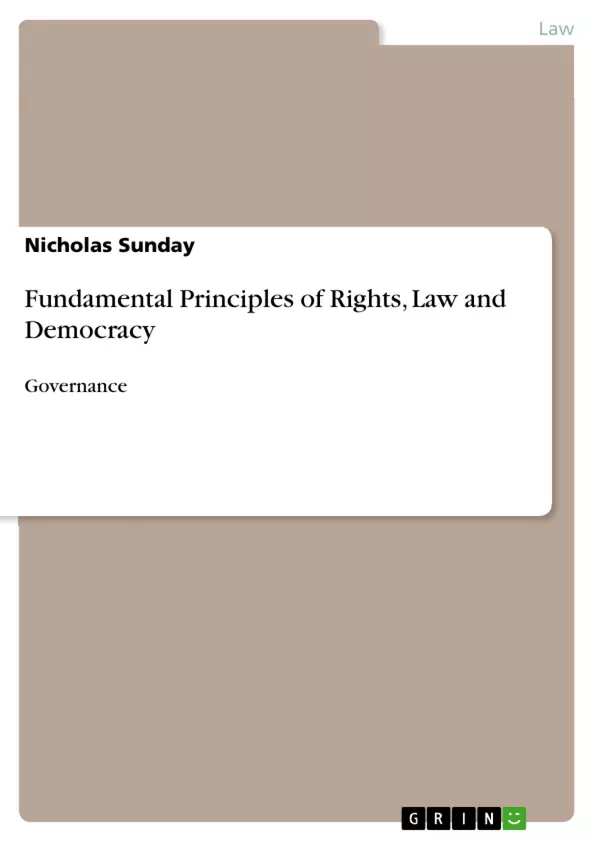Rights and duties are correlative conceptions, that is to say, every right carries with it a corresponding obligation. They are like the two sides of a coin. Rights depend upon duties. “It is only in a world of duties that rights have significance”.
Also, every right requires social recognition, without such recognition, rights are empty claims. Rights do not exist in a vacuum. They require the sanction of society. A right is likewise not a selfish claim. It is a disinterested desire; it is something which is capable of universal application. In asserting my right, I am really rendering a public service and when I fight for the rights of others, I may do so at great personal loss or inconvenience to myself.
Older societies as a rule did not recognize rights to any great extent. They had only petitions and charities. Modern societies on the other hand give a very important place to rights. The French Revolution did not ask for charity; it demanded the rights of men. Some, if not all, of our present day constitution’s guarantee certain fundamental rights for their citizens. Rights have a tendency to grow. New rights frequently come into being, e.g. the right to work, the right to strike, and the right to retain one’s job when one is on strike etc.
Table of Contents
- Chapter 1: Introduction
- 1.2 Theories of Rights
- 1. The theory of natural rights
- 2. The legal theory of rights
Objectives and Key Themes
This text aims to explore the fundamental principles of rights, law, and democracy, examining the interplay between individual rights and societal obligations. It delves into different theoretical perspectives on the origin and nature of rights, analyzing their historical context and practical implications.
- The correlation between rights and duties
- Competing theories of rights (natural rights, legal rights)
- The role of society in the recognition and enforcement of rights
- The evolution and expansion of rights throughout history
- Criticisms and limitations of different theories of rights
Chapter Summaries
Chapter 1: Introduction: This introductory chapter establishes the fundamental concept that rights and duties are intrinsically linked, existing as two sides of the same coin. It highlights that rights are not merely individual claims but require social recognition and sanction. The chapter contrasts older societies' reliance on petitions and charity with modern societies' emphasis on rights, using the French Revolution as a pivotal example of a shift towards demanding rights rather than charity. The growth and evolution of rights, exemplified by the emergence of rights to work, strike, and job security during strikes, are also discussed. The chapter lays the groundwork for exploring various theories of rights presented in subsequent sections.
Keywords
Rights, duties, natural rights, legal rights, social contract, French Revolution, American Declaration of Independence, theory of rights, individual liberty, state, law, social recognition, moral basis, historical context.
Frequently Asked Questions: A Comprehensive Language Preview
What is the overall topic of this text?
This text explores the fundamental principles of rights, law, and democracy, examining the interplay between individual rights and societal obligations. It delves into different theoretical perspectives on the origin and nature of rights, analyzing their historical context and practical implications.
What are the key themes covered in this text?
Key themes include the correlation between rights and duties; competing theories of rights (natural rights, legal rights); the role of society in the recognition and enforcement of rights; the evolution and expansion of rights throughout history; and criticisms and limitations of different theories of rights.
What theories of rights are discussed?
The text discusses the theory of natural rights and the legal theory of rights, comparing and contrasting their approaches to understanding the basis and scope of rights.
What is the relationship between rights and duties according to this text?
The text emphasizes that rights and duties are intrinsically linked, existing as two sides of the same coin. Rights are not merely individual claims but require social recognition and sanction.
How does the text illustrate the historical development of rights?
The text uses the French Revolution as a pivotal example of a shift from petitioning and charity to demanding rights. It also discusses the evolution of rights such as the right to work, strike, and job security.
What historical events are mentioned in relation to rights?
The French Revolution and the American Declaration of Independence are mentioned as significant historical events that shaped the understanding and development of rights.
What are the main chapters covered in this text?
The provided preview includes a chapter summary for Chapter 1: Introduction. Further chapters are implied but not detailed in this preview.
What are some of the keywords associated with this text?
Keywords include: Rights, duties, natural rights, legal rights, social contract, French Revolution, American Declaration of Independence, theory of rights, individual liberty, state, law, social recognition, moral basis, historical context.
What is the purpose or objective of this text?
The text aims to explore the fundamental principles of rights, law, and democracy, examining the interplay between individual rights and societal obligations from different theoretical perspectives.
Who is the intended audience for this text?
The preview does not explicitly state the intended audience, but the academic nature of the content and the structured presentation suggest it is likely intended for students or scholars in fields related to law, political science, or philosophy.
- Quote paper
- Professor Nicholas Sunday (Author), 2013, Fundamental Principles of Rights, Law and Democracy, Munich, GRIN Verlag, https://www.grin.com/document/209592



